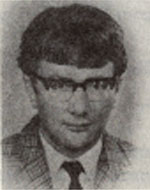Gafni, Arthur
Arthur, son of Deborah-Leah and Zwi Yavdalev Weinstock, was born on 21.11.1938 in Bucharest, Romania. He attended elementary school in his hometown and graduated from high school. Arthur had a happy childhood in the lap of his loving family until the outbreak of World War II. In elementary school he was a student like all the students and in his neighborhood he felt no restriction or rejection because of his Jewishness. Therefore, he did not feel close to Israel, even though his parents made sure to give him a traditional Jewish education. But the persecutions of the Jews during the war and the terrible Holocaust of his people changed him completely. His home became full of Zionist spirit and the aspiration to immigrate to Eretz Israel became a topic of conversation every day. Arthur began to understand the importance and need for a national home for the Jewish people and suddenly began to feel alien to the environment in which he was born and raised. The aspiration to immigrate to the Land of Israel and to do for his people as he was able to complete it became a dream fulfilled in his adult life. In 1951, when he was only thirteen years old, he was orphaned from his mother. It was a hard blow to Arthur, who loved his mother very much and was deeply attached to her. The idea of immigration to Eretz Israel was postponed for a period of several years but was not abandoned, and in January 1959, at the age of twenty-one, he immigrated with his father and sister to Israel. Arthur was a vigorous young man with many talents and a great thirst for knowledge. He had an amazing memory capacity and was able to memorize dozens of details without effort. Moreover, he always strove to penetrate into the roots of every problem and detail. He liked to learn, and he always wanted to be knowledgeable. Arthur was drafted into the IDF in early August 1959, a few months after arriving in Israel, and was assigned to the Armored Corps. After completing basic training, he completed various courses in the corps. Soon his commanding officers were able to remember quickly and reliably the details and transferred him to the quartermaster section. Arthur willingly went through further courses and studied various fields of the quartermaster’s profession. Within a relatively short period of time, he was sent to a quartermaster course and finished with great success. At the end of his regular service, he accepted the demands of his commanders and volunteered for a career army service, and was an efficient officer with excellent organizational skills and extensive professional knowledge. As an excellent chess player and an avid sports fan, he participated in most of the IDF competitions in these areas. He also liked to participate in marches and ointments and was careful not to miss the “Three Day March,” “Crossing the Sea of Galilee” and other similar competitions. Arthur was also a fascinating socialite, blessed with a clear tongue and an excellent sense of humor. So he was one of the most beloved commanders in his unit. During this period he married his girlfriend Shulamit and eventually they had two children – a daughter and a son. Arthur’s happiness was great; he excelled in his work and had a warm home and a loving wife who helped him carry out his duties even when he was away from home. But this happiness did not last long. During the Yom Kippur War, Arthur took part in the battles against the Syrians in the Golan Heights. On October 10, 1973, he was injured in the enemy’s attack and was killed. He was laid to rest in the military cemetery in Kiryat Shaul. He left behind a wife, a daughter and a son, a father and a sister. His family donated a Torah scroll to the “Tehilot Yisrael” synagogue in Ramat Gan; and at the Avigur School in Ramat Gan, a reference library was opened in memory of Arthur.
